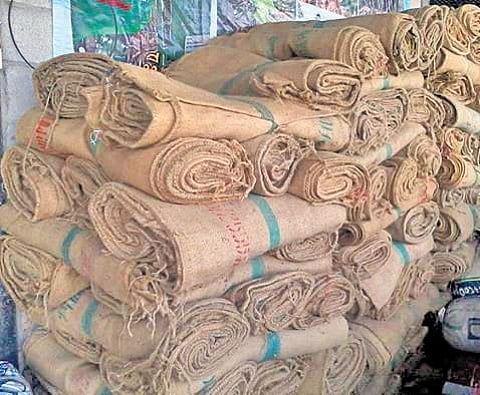

KOLKATA: The jute industry on Friday welcomed the West Bengal government's decision to allow millers to operate with 100 per cent workforce as the sector is reeling under a supply backlog for packaging foodgrains in the wake of the lockdown.
The state government permitted millers to deploy 100 per cent workforce in factories from June 1.
The supply backlog mounted to 2.5 lakh bales for the current rabi season as the mills with a reduced workforce have been struggling to meet the jute bags requirement of the government sector amid the lockdown, an industry official said.
"The backlog is 2.5 lakh bales. The West Bengal government had given permission to operate with 50 per cent workforce during the lockdown. Now, we are allowed to deploy 100 per cent from June, which is a welcome step.
"Of 60-odd mills in West Bengal, operations in 10-12 units in North and South 24 Parganas and Howrah were disrupted due to cyclone Amphan," Indian Jute Mills Association (IJMA) chairman Rahav Gupta told PTI.
Despite the Centre's request and the industry's assurance of maintaining social distancing norms in the workplace, the West Bengal government had earlier not allowed millers to resume operations with full strength, sources said.
The Assam government had already allowed tea factories, jute mills and other industries to deploy 100 per cent workmen.
"The decision of the Bengal government came late. The current situation was manmade. Allowing millers to operate with higher capacity has dual benefits as it could stop job losses and prevent migration of labourers.
"The jute sector is among a few industries, which have jobs to offer to workers even in this crisis period," a former IJMA chairman said on condition of anonymity.
States like Madhya Pradesh, Telangana and Chhattisgarh were seeking jute bags for packaging foodgrains, sources said.
The mills are yet to supply approximately 3 lakh bales of jute bags for 2020-21 rabi crop season, they said.
The Department of Food and Public Distribution has intimated requirement of 16.94 lakh bales of jute bags by various states for the 2020-21 Kharif season, according to the sources.
"Jute mills are required to supply 20 lakh bales by November 2020 to secure PDS operations," they added.